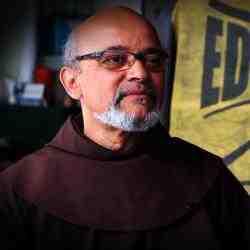Introdução
Educator and theater director Mauricio Leite creates excitement about learning and the world of ideas even in remote regions of the Amazon. His Project Suitcase succeeds in isolated areas where expensive literacy campaigns have failed, largely because he gives teachers attractive means and simple methods to make learning fun.
A nova ideia
Children living in situations of limited intellectual stimulation can become eager students when their teachers give "classes that don't look like classes," says Mauricio. He circulates "suitcases" of carefully selected children's literature, theatrical makeup, puppets, audio tapes, and tape recorders among isolated schools in the Amazon state of Mato Grosso. Mauricio has observed in literacy campaigns that merely putting materials, however brilliant, into teachers' hands does not guarantee success. So he travels to show teachers in their classrooms, with their students, how to act out stories and otherwise use the suitcase materials creatively. In these sessions, Mauricio encourages children to teach their teachers how to play. In turn, directed play then draws students into the realm of literature and, consequently, into reading and writing. Through city contacts and literacy networks, Mauricio continues to discover new materials and the best of children's literature from around the world to replenish the suitcases. Literacy is a measurable goal of Project Suitcase. Students read as many as 120 books a year for the fun of it. But, as Mauricio says, "it's not enough to teach people to read, we want to give people a thirst for knowledge."The project also has holistic goals that include greater self-awareness and respect for local culture and environment. For example, each suitcase contains a mirror, ostensibly for applying stage makeup but also to allow poor students the rare experience of looking at themselves. Parents provide valuable gems of local culture and bits of history. Searches for art materials lead to nature hikes or trash recycling. Students help keep Project Suitcase going through a UNICEF-backed workshop, where they build the wooden suitcases and produce traditional Brazilian toys destined for city markets.
O problema
In Brazil, trying to promote reading for pleasure is terribly difficult since, as Mauricio points out, many teachers don't know how to read. This is especially true in Amazonian states such as Mato Grosso, where Mauricio has implemented Project Suitcase."Qualified people don't go to those areas," says Mauricio. "They stay along the coast. There are no comforts. There's liable to be a snake under your bed, and the pay is very little." Moreover, the violence that characterizes much of the Amazon can make the work dangerous. In addition to such impediments to education, Mauricio also finds a great deal of shame among the Amazon's poor about their local customs and manners of speaking. Now television reaches deep into Brazil's interior with its homogenizing effect on cultures, and new waves of immigrants from the south arrive by the truckload, buying large stretches of land and threatening the region's local self-esteem and cultures.The burning of the Amazon is notorious and a much discussed global concern. Developing environmental awareness among its residents is the essential prerequisite for change and an integral part of Mauricio's package. One group of his students recently wrote a disturbing letter arguing that their families needed to slash and burn forest clearings--then dated the letter 1930, the year their forebears arrived in Mato Grosso.
A estratégia
Mauricio's passion for education exceeds national, ideological, and methodological biases. He uses whatever works. Each of the now 50 suitcases contains 30 children's books of various age and skill levels, along with aids to enliven them. Schools in different Mato Grosso counties rotate the suitcases, with each class keeping a suitcase for two months, then exchanging it for another. By the end of the school year, despite forest roads that turn to impassable mud for weeks at a time, the students have read and enjoyed 120 top-quality and very diverse books, an exceptional number in any classroom. A factor in the program's success is certainly the suitcase contents, which reflect Mauricio's literacy expertise, theater background, and skill at "making nice things from trash." Students make the puppets from scrap materials they find; the suitcase lid becomes the puppet stage. When students complain that they have no costumes to enact stories, Mauricio shows them how, with imagination, they can create costumes from whatever's at hand. At a city newsstand, Mauricio discovered a series of audio tapes of children's stories set to popular music. He found the producer and bought dozens on the environment and folklore. Each suitcase contains one of these tapes, a blank tape, and a portable tape recorder. Students listen to stories and record their own, giving a new importance to self-expression and local tales, while involving children intimately in the very origins of literature. Students on Bananal Island in Mato Grosso build the suitcases in a workshop Mauricio created. The students at the workshop also share with Project Suitcase the profits they make by selling the traditional Brazilian toys they produce from the lightweight wood of the stems of the buriti palm leaves. To reinforce their ecological concerns, Mauricio asks them to take only two dry fronds from each tree to keep from injuring it. He contends that the buriti's airy wood makes a great natural substitute for styrofoam. Mauricio spends most of the year in Mato Grosso, working with teachers and coordinating the suitcase workshop. His support team there consists mainly of Catholic priests and elderly residents who continue the project while he's on the road. Some months he spends in Brasília, working as a consultant to earn a living and promote his educational ideas. In Mato Grosso and Brasilia, Mauricio represents the National Foundation on Books for Children and Youth, a Rio-based organization linked to international book networks. He searches the foundation's networks for new children's literature from around the world to replenish the suitcases.
A pessoa
Popular libraries and theater groups seem to spring up wherever Mauricio goes, as if a magical Johnny Appleseed of the mind has passed. He's a storyteller in public plazas, and an actor and puppeteer with theater in his blood. As a restless teenager, he bargained with his father to attend a teaching preparatory course in the afternoons, where he was the only male among 400 students. The father's side was that he attend military school in the morning.His creativity flourished despite the military rules in the morning and uninspiring assignments in the afternoon, such as making decorative covers for tampon boxes. He ventured into theater during those years, and at 15 started a variety program on the radio.He got along well with his teachers, did well in school, and earned a scholarship to a Rio university. He enrolled in Brazil's first-ever art education degree program and studied every course offered. Upon graduating, he returned to his hometown, Cuiabà, and began teaching theater at a high school. In his first semester, Mauricio helped his students write and perform the school's first play, a spoof of the educational system. It created such a stir that the newly appointed state Minister of Education made a point of seeing the play. The next day, the minister bypassed the school's chain of command to personally fire Mauricio. Mauricio's students there still speak of him with great admiration. Mauricio's style is unconventional because the conventional hasn't worked in Mato Grosso. He personally knows Brazilian educator Paulo Freire and is well grounded in the educational theories of Montessori, Piaget, and others. But he finds nothing sacred in any methodology and can toss them all aside to get results. Mauricio uses comic books, wordless books, folk tales, and art of every description to get people reading. One of his books soon to be published is really a set of alphabet flash cards of comic book onomatopoeia, a meticulous research from "aargh" to "zap" in comic books the world over. He demonstrates how the readers can play with the sounds, stretching them out, saying them under water, etc. Says Mauricio, "It's not a book, it's a class."




